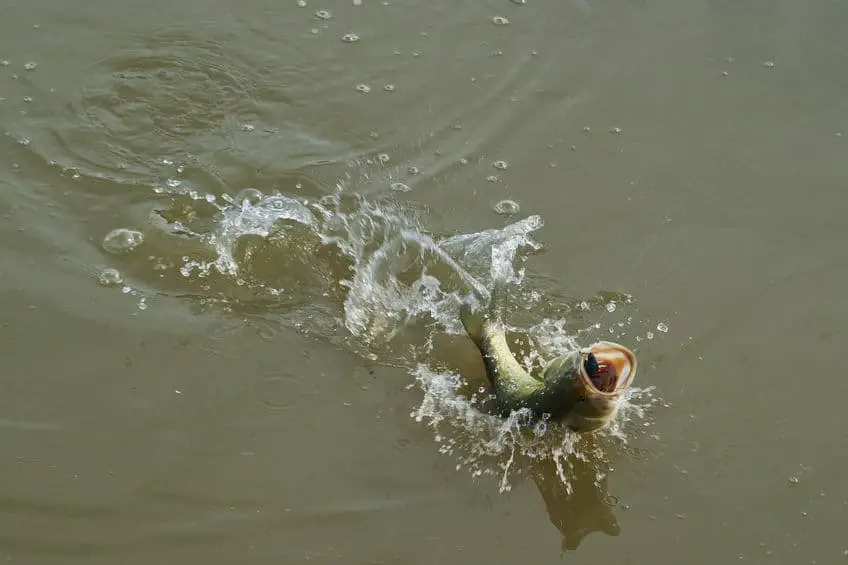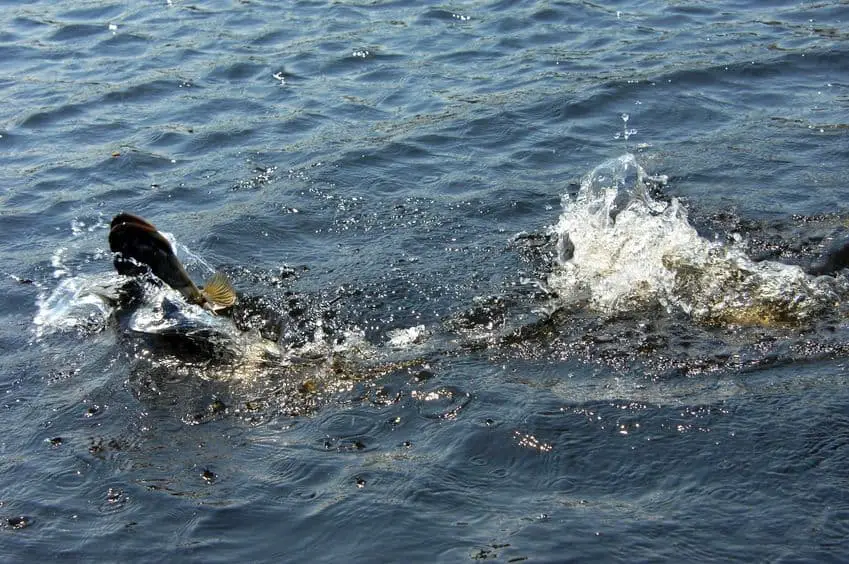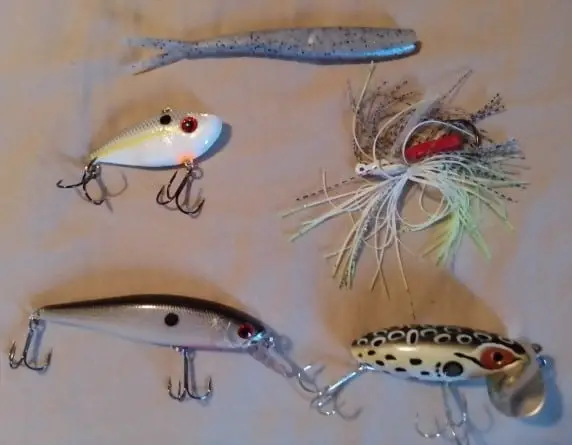
Watching huge bass hit the top of the water is extremely exciting as a fisherman. After a long morning of no bites, watching a bass jump out of the water provides a little hope that the fish are active and that you won’t get skunked today. When you hook into a bass and it leaps out of the water during the fight is even more exciting! There are two main reasons why bass leaps out of the water and they each have their reasons and meaning.
Bass will often jump out of the water after being hooked to try and free themselves. The reason that this is effective is that air is less dense than water which allows the bass to put more force behind head shakes. Bass are also seen jumping out of the water when chasing baitfish or bugs on the water’s surface, but this is less common.
Having a hooked bass jump out of the water is exciting but it can commonly lead to you losing the fish. Watching bass leap out of the water from a distance is also fun to watch but it may mean that they will be harder for you to get ahold of.
How to stop hooked bass from jumping?
When a bass is hooked, it isn’t aware of your presence. All the fish knows is that there is something crazy going on with what it just ate and that the line is trying to pull it in a certain direction. Instinctually, the bass is going to pull away from and resist the line reeling it in. Knowing this can help you manipulate the fish into doing what you want.
The way that you point your rod when reeling in the bass changes the way the line pulls. If you have your rod tip pointed straight down towards the water, the bass is being pulled parallel to the surface of the water. Positioning the rod this way gives the bass a choice between surfacing and diving deeper which will often lead to the bass leaping out of the water and spitting the hook.
When you’re fighting a bass, you can feel when they try to pull up to the surface of the water. Pull back slightly on your rod so that the fish feels you pulling him towards the surface and naturally he will fight to swim back down. You can also pull down and to the left/right to manipulate the bass into avoiding the jump. Try both methods to see which one works better for you.
You can read more about proper reeling techniques here: Techniques on How to Reel in a Fish (takemefishing.org)
What does it mean when bass jump?
Sometimes you can see bass hitting the top of the water or even jumping. Seeing a bass actually leap out of the water when it isn’t hooked is pretty uncommon. Oftentimes anglers assume that it is a bass that just jumped out of the water, it can commonly be a carp.
When bass do jump, however, it’s because they are chasing hatchlings right under the water’s surface or are coming up to eat bugs that are laying on top of the water.
You can find videos all over YouTube of aggressive largemouth attacking topwater baits like frogs and fishermen love to use them because they trigger those big strikes.
Why are they jumping but not biting?
When the bass are active and striking the top of the water, it’s easy to assume that they’re hyper-aggressive and easy to catch. Unfortunately, that is most likely not the case. The good news is that if you are watching bass strike the top of the water abundantly, that keys you in on what they’re after at that time. If you are watching bass hit the top of the water, they’re feeding on something and you need to mimic whatever that is.
A good rule of them that applies to any situation, but especially this one: If you’re not getting bites, switch to a smaller presentation, never bigger.
It’s also possible that you are using the wrong presentation of bait or color at that moment. Understanding what conditions to use certain baits can seem overwhelming at first but comes naturally after you get some experience on the water. Make sure that you don’t switch baits too often though. Sometimes the bite is just slow even if you’re doing everything right.
Keeping reading to see what I recommend to catch that stubborn bass that just won’t bite but will hit the top of the water.
If you see a fish jumping out of the water for seemingly no reason, it could be that it was being chased by a larger predator like a muskie. In this case, there is no reason to assume that they’re willing to bite anything.
If you are unsure that it is bass jumping out of the water, try to watch more closely and get a positive identification. Sometimes carp will jump out of the water. If you’re trying to catch carp using bass fishing methods, you won’t have any luck so that may be why you see fish jumping out of the water but not striking any bait.
Here’s how to catch jumping bass

Understanding what the bass are doing when they jump and what they’re after will increase the odds that you can hook up. Most anglers watch the bass hitting the water and automatically start throwing they’re favorite top water bait, like a ‘Whopper Plopper’. Sometimes this is enough, but most of the time the fish won’t be interested in your bait. Here’s what you should do instead.
First off you need to observe what has the bass acting this in this uncommon way. If they’re in a frenzy under some brush leaning over the water, they’re after some type of bug and your best bet would be to observe what it is and try to present your bait in the same way.
When the bass are consistently hitting the top of the water for bugs, they will hardly bite anything else because other food sources are more work than what they’re getting.
If you have a fly rod, you can match that prey effectively and cash in. A small floating ‘Topwater Popper’ will get the job done if you don’t have a fly rod on hand. Really anything that floats with some feathers on it will give you the closest presentation and the best opportunity.
If it is small prey fish that they’re chasing, you might look toward a traditional crank-bait. Instead, go for a lip-less crank or a fluke. Working a swim jig or a suspending jerk bait fast and erratically may land you a few strikes as well.
If you’re interested in seeing exactly what gear I use, including the lures I recommend, check out my Recommended Gear Page!
Learning about the area that you’re fishing can give you an idea as to what colors to use when you’re trying to mimic those baitfish. The best way to learn is to just get out there and keeping fishing to see what works best for you.

Sometimes there is NOTHING You can do, and that’s ok
One of the most frustrating things as an angler is to have a long day of slow and hard fishing. It gets worse when you can actually see fish being active and jumping or swarming. Something that we all have to accept as anglers is that there are days where the conditions are perfect and you’re fishing the right lure the right way but you’re still not getting strikes.
Despite what you see on YouTube, even the big guys have tough days and they’re not always reeling in five pounders.
In times like these where everything that seems to make sense isn’t working, I like to throw an unorthodox presentation or a crazy-ugly lure that I bought just to try out for fun. Sometimes I will end up hooking bass on that ugly old lure and it just makes the whole day better.
My point is to remember why we fish. We fish to get outside and enjoy the weather and spend time with nature or our family and friends. Don’t let a hard day of fishing frustrate you too bad and get back out there tomorrow.

